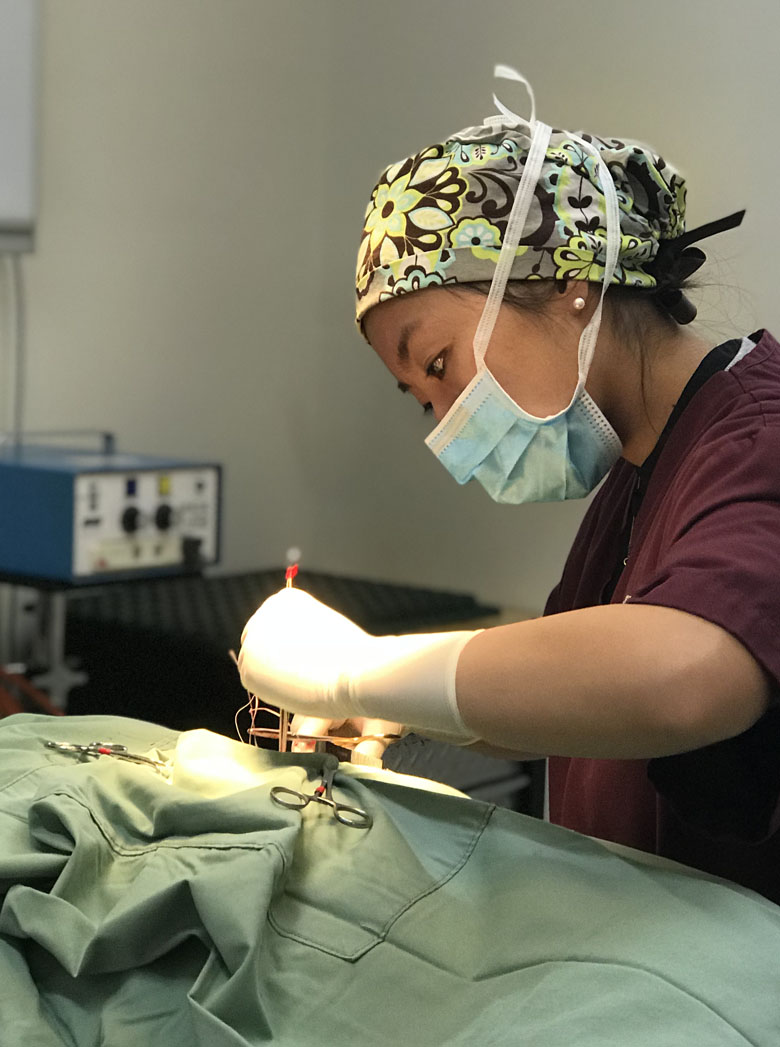General Surgery
At the Hoppers Crossing Veterinary Clinic and Hospital, we perform routine surgeries on dogs, cats and even rabbits, ferrets and rats! The surgeries we perform include desexing, dental procedures, lump removals, cruciate repairs and more. There are a few things to know before your animal is going to have surgery:
The night before: Your animal must not eat anything from 830pm the night before- it needs to have an empty stomach to have the anaesthetic. It can have water overnight but take it away first thing in the morning.
On the day: Please give your animal a chance to go to the toilet in the morning before bringing it in. If you have a dog, this may mean taking it out for a 5 minute walk. Bring your animal in at 8:30am, and it will be admitted between 8:30 and 9am.
When you admit your animal to surgery, there are some optional extras you may chose from:
Microchipping: If your animal is not already microchipped, then it is a good opportunity to have it done under the anaesthetic. Microchipping involves a small microchip being placed under the skin on the back of the neck. The tiny microchip has a unique identification number that belongs to your pet and is linked to your contact details on a 24-hour national computer database. All lost pets are scanned by vets and council pounds for a microchip. The cost covers implantation and lifetime record on the database.
IV Fluids: For all anaesthetics, there is the option of having intravenous fluids for the procedure. This is mandatory for all animals that are debilitated/sick or over 8 years old. Intravenous fluids help to boost the blood pressure of your pet when under the anaesthetic, and also keeps them well hydrated which aids recovery. Intravenous fluids are recommended in all cases however they do come at an extra cost.
Pre-anaesthethic Blood Profile: A small blood test can be taken on the morning of the procedure and run in our in-clinic lab. The blood test helps us to assess blood count, kidney, liver and general organ function. Sometimes even in apparently healthy animals we may detect abnormalities that require special attention. A pre-anaesthetic blood profile is recommended for all pets especially older pets or if animals are sick or debilated in anyway.
We ask that on the day of the procedure, you call us at 3pm to organise a discharge time. There are some things to consider for when you take your pet home after they have had an anaesthetic:
After an anaesthetic your pet may feel drowsy. Therefore keep them quiet and confined inside for two days after surgery to allow full anaesthetic recovery. If your pet is still depressed after two days you should call the clinic.
Feed your pet only a small meal the night after the surgery, but allow free access to water.
No exercise for 7 days, then lead walks only for the next 7 days (or until the stitches are removed) .
Check the wound and stitches each day for swelling or discharge. If there is a drain tube please make an appointment in 3 days time to have it removed.
Ensure your pet does not lick or bite at the wound at all. An elizabethan collar is required for stitches to prevent this. A SMALL amount of swelling only may be normal in wounds after surgery. Any swelling should be reported to us for assesment.
Please phone the clinic after 10-14 days to organise stitch removal, and do not bath your pet until the stitches have been removed.

For any concerns about your pet's health, or to make an appointment, please contact Hoppers Crossing Veterinary Clinic & Hospital or call us on (03) 9748 6644.
Payment Options
At Hoppers Crossing Veterinary Clinic & Hospital we have a number of payment options available including cash, credit card and EFTPOS facilities. We also offer the GapOnly® payment service that works with selected pet insurance, so you can access your pet insurance benefit right away for eligible expenses.
Contact Us
For any questions about your pet's health, advice, or to book an appointment, please give our team a call.
Subscribe to our Newsletter
Join our mailing list to receive the latest news and updates from our team.